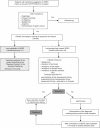Structured management strategy versus usual care for gastroesophageal reflux disease: rationale for pooled analysis of five European cluster-randomized trials
- PMID: 21317991
- PMCID: PMC3036966
- DOI: 10.1177/1756283X10387060
Structured management strategy versus usual care for gastroesophageal reflux disease: rationale for pooled analysis of five European cluster-randomized trials
Abstract
Background: Gastroesophageal reflux disease (GERD) has a major impact at the primary care level and there is a need to evaluate whether the diagnosis and therapeutic management of GERD in Europe needs to be improved.
Methods: This project was designed to test the hypothesis that a new primary care management strategy would improve outcomes for patients with GERD, compared with usual care, in Europe. The analysis pools five separate cluster-randomized studies conducted in Austria, Italy, Norway, Spain and Sweden. These studies used a strategy based on the self-administered GerdQ questionnaire to stratify adult patients with symptoms of heartburn or regurgitation according to the frequency and impact of symptoms. A score of ≥8 indicates a high probability of suffering GERD. Patients with a GerdQ impact score ≤2 were treated with generic proton-pump inhibitors according to local guidance, and patients with an impact score ≥3 were treated with esomeprazole 40 mg once daily.
Results: In total, 2400 patients were enrolled across the five studies. The protocols were modified by individual countries according to their local guidelines/requirements. In Norway, the new management strategy was compared with traditional routine endoscopy and 24-hour pH-metry, and encompassed proton-pump inhibitor reimbursement restrictions. Outcome measures differed by country, but included control of GERD symptoms, self-rated health status and work productivity, treatment changes, specialist referrals and physician adherence. GERD-related use of healthcare resources was also evaluated.
Conclusion: The pooled analysis will determine whether a locally adapted primary care management strategy for GERD, using GerdQ as a patient-tailored diagnostic and therapeutic evaluation tool, is beneficial compared with usual care across five countries with different standard approaches to GERD management and control.
Keywords: GerdQ; gastroesophageal reflux disease; pooled analysis.
Figures













References
-
- Armstrong D., Marshall J.K., Chiba N., Enns R., Fallone C.A., Fass R., et al. (2005) Canadian Consensus Conference on the management of gastroesophageal reflux disease in adults - update 2004. Can J Gastroenterol 19: 15–35 - PubMed
-
- DeVault K.R., Castell D.O. (2005) Updated guidelines for the diagnosis and treatment of gastroesophageal reflux disease. Am J Gastroenterol 100: 190–200 - PubMed
-
- Howden C.W., Henning J.M., Huang B., Lukasik N., Freston J.W. (2001) Management of heartburn in a large, randomized, community-based study: comparison of four therapeutic strategies. Am J Gastroenterol 96: 1704–1710 - PubMed
LinkOut - more resources
Full Text Sources

